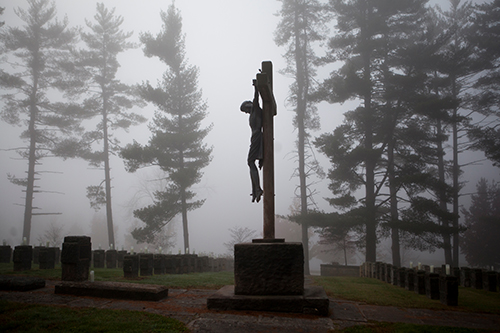
Listen to Our Podcast
Echoes from the Bell Tower, a podcast devoted to stories of wit and wisdom from the monks of Saint Meinrad.
Absent Alleluia
By: Fr. Adrian Burke, OSB
Thursday, March 7, 2019

"From the holy feast of Easter until Pentecost, 'alleluia' is always said with both psalms and responsories ... [and] every Sunday except in Lent."
Rule of St. Benedict 15
The whole of chapter 15 of St. Benedict's Rule is one verse. That's how short it is. The above excerpt amounts to a quarter of the entire chapter. In a liturgically centered tradition such as the Catholic Church has (and being Benedictine, we are arguably the most liturgically centered of all the kinds of religious life in the Church), it's notable that Benedict makes such a big deal about "the times for saying Alleluia" -- the title given to RB 15.
Alleluia is a word that has its roots in the Hebrew phrase Hallelu-yah, meaning "praise Yahweh" (God). In the Christian tradition, we've incorporated the word as an expression, or exclamation really, of our love for God in light of the good works of salvation that God has accomplished for us.
This is why in the liturgical tradition of our church we make special use of it in reference the greatest of all God's deeds: God's self-giving gift as Christ laying out his life for our redemption and God's ratification of Jesus' gift by raising him from the dead. So we refrain from saying Alleluia during Lent as a way to intensify our gratitude at Easter, the most solemn of all feasts for the Christian believer.
Lent is a sober time; a time to intensify our awareness of personal sin, and our complicity with social sin by self-centered behaviors or attitudes that "demonize" or "scapegoat" others by means of gossip, passive aggressive, or vindictive behavior. These behaviors contribute to a world divided against itself. By refraining from the use of Alleluia during Lent, we intensify our yearning for freedom from sin and fear, the freedom of the children of God won for us by Christ.
Fr. Alfred Delp was a German Jesuit priest who was killed by the Nazis for preaching against the regime. He believed in hope. "What good does it do us to sense and feel our misery unless a bridge is thrown over to the other shore? What help is it to be terrified at our lostness and confusion unless a light flashes up that is a match for the darkness … or to shiver in the coldness and hardness in which the world freezes … and kills itself, unless we also come to know the grace that is mightier than the peril of oblivion?"
Even in the depth of our Lenten winter, we must somehow stay connected with the hope of spring and the promise of resurrection. The absence of the Alleluia during Lent is a stark reminder of the promise of Easter - throughout Lent may our desire for it grow stronger until once again we can sing with great gusto the solemn Alleluias of our Easter joy!